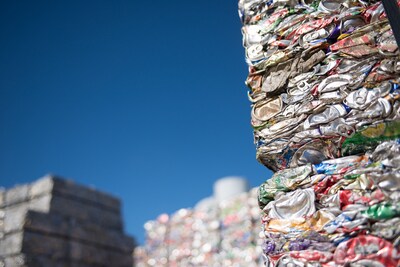The Economic Impact of Aluminum Recycling: Jobs, Supply Chain and Sustainability
ATLANTA, Dec. 6, 2024 /PRNewswire/ -- A thought leadership piece by Chris Cerone, Vice President, Public Affairs & Communications at Novelis
Aluminum recycling is not just a process of reusing materials; it is a powerful engine driving economic growth, supply chain resiliency and environmental sustainability. At Novelis, we have long championed the benefits of recycling aluminum, recognizing its critical role in shaping a sustainable and prosperous future.
Creating Jobs and Boosting the Economy
The aluminum recycling industry is a significant contributor to job creation and economic activity. Novelis alone employs approximately 5,000 people in the United States, with another 1,000 people to be hired at the fully integrated aluminum facility the company is building in Bay Minette, Alabama. These positions range from collection and processing to manufacturing and research, providing diverse, high-paying employment opportunities and stimulating local economies. In its report, "Aluminum Beverage Can: Driver of the U.S. Recycling System," the solid waste consulting firm Gershman, Brickner & Bratton (GBB) concluded that without the revenue from used beverage cans, most material recovery facilities (MRF) in the United States would not be able to operate without changes to their business models. MRFs sort single-stream recyclables for sale to recyclers.1
Moreover, the economic benefits of aluminum recycling extend beyond direct employment. For every job created within the industry, additional positions are supported in related sectors, including transportation, retail and services. The Aluminum Association calculates this multiplier effect as 3.5 indirect jobs for every direct industry job, underscoring the importance of recycling facilities as economic anchors in many communities, though the full potential of such facilities is far from being realized.2
Nationwide, the United States recycles only about 45% of aluminum cans annually, which means there is a tremendous upside to achieve meaningful economic and environmental benefits. This is confirmed in a study entitled "Recycling Aluminum Cans Is Good Business" by Ball Corporation.3 It highlights the potential additional economic benefits the U.S. could realize simply by improving the country's aluminum recycling rate. The report postulates that reaching a recycling rate of 90% by 2030 would create massive opportunities to improve our environment and grow our economy, and the numbers are impressive. For instance:
-------------------------
Recycling 90% of aluminum cans would create about 104,000 jobs, double industry wages and generate $1.6B in economic activity.
Ball Corporation. (n.d.). Recycling Aluminum Cans Is Good Business. Retrieved from Ball Corporation [ball.com].
-------------------------
Supply Chain Resiliency and Cost Efficiency
One of the most compelling advantages of aluminum recycling is its supply chain and resource use efficiency. This has taken on greater significance given aluminum's designation as a critical material by the United States, Canada, Europe and other countries. Without recycling, it will not be possible to meet the growing demand for aluminum—and low-carbon secondary aluminum, in particular. Primary aluminum production remains quite limited in the United States, and importing from less reliable producers is no longer a viable option, especially given the proliferation of tariffs and other market access barriers.
Additionally, aluminum can be recycled repeatedly with no degradation in the quality of the material. This stands in stark contrast to most other materials that have recyclability limitations, including materials that cannot be recycled into the same product, must be "downgraded" into a different product, or can only be recycled a few times. Aluminum's recyclability advantage can and should be maximized to shore up supply chains for the critical material and reduce the need for new raw material and the environmental impacts of mining and refining. This is why Novelis is proud to have "closed-loop" arrangements in place with many of its customers to ensure pre-consumer scrap generated during their production processes is returned to Novelis for recycling, casting and rolling.
Environmental Impact and Sustainability
At Novelis, we are committed to reducing our carbon footprint and promoting environmental stewardship. Aluminum recycling plays a pivotal role in achieving these goals. Novelis recycles 2.3 million metric tons of aluminum scrap each year, the weight equivalent of six Empire State Buildings. The company also recycles more than 82 billion used beverage cans each year on a global basis, and this number will approach 100 billion when our plant in Bay Minette is up and running. Stacked end-to-end, these recycled cans could go around the Earth more than 250 times. By recycling aluminum, we significantly cut greenhouse gas emissions associated with primary aluminum production. That's because producing aluminum from recycled material requires only 5% of the energy and emits 95% less greenhouse gases relative to the process for making primary aluminum.
Recycling also minimizes waste sent to landfills, the capacity of which is declining in parts of the country. And, while the 45% recycling rate for used beverage cans should be much higher – and in line with many other countries -- it does translate into reduced landfill, lower disposal costs and less environmental degradation.
Moving Forward Together
Aluminum recycling is a cornerstone of the circular economy—a system where resources are used more sustainably, waste is minimized, and products are designed for long-term use and recyclability. By promoting a circular economy, we can ensure that sustained economic growth, supply chain resiliency and environmental health go hand in hand. Work remains, for sure. At Novelis, we are dedicated to advancing recycling through innovation, policy incentives, infrastructure and partnerships. We look forward to continuing our work with other stakeholders to accelerate and maximize the important benefits of recycling aluminum.
As we continue to explore new ways to enhance recycling efficiency and expand its reach, Novelis invites all stakeholders—industries, governments, and consumers—to join us in harnessing the full potential of aluminum recycling.
Together, we can create a more sustainable and prosperous future.
-------------------------
- Can Manufacturers Institute. Aluminum Beverage Can: Driver of the U.S. Recycling System. Retrieved from Can Manufacturers Institute [cancentral.org].
- Aluminum Association. (n.d.). Economic Impact. Retrieved from Aluminum Association [aluminum.org].
- Ball Corporation. (n.d.). Recycling Aluminum Cans Is Good Business. Retrieved from Ball Corporation [ball.com].
• Job Creation: Add nearly 104,000 new jobs in collection, sorting, and reprocessing to the U.S. economy.
• Increased Wages: More than double total waste collection and recycling industry wages from $2.1 billion to $5 billion.
• Economic Activity: Generate $1.6 billion in economic activity through material sales.
• Landfill Reduction: Keep 1.3 million tons of materials out of landfills each year.
• Energy Savings: UBC recycling helps shape a sustainable world by using just 5% of the energy required to make primary aluminum, saving enough energy to power 1.5 million homes for a year.
• Emissions Reduction: Reduce GHG emissions by 12.1 million metric tons of CO2 annually – equivalent to taking 2.6 million cars off the road for a year.
View original content to download multimedia:https://www.prnewswire.com/news-releases/the-economic-impact-of-aluminum-recycling-jobs-supply-chain-and-sustainability-302324838.html
SOURCE Novelis Inc.
Released December 6, 2024

